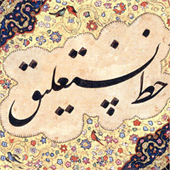
1206:The Delhi Sultans (1206-1555) established. Mamluk dynasty (1206 – 90) founded. It was the first of the five dynasties known as the sultanates ruler from Delhi (1206 - 1526). Following the loss of the Ghurids' Western dominions to the Khwarazm Shahs, the Mu'izzi Sultans or Slave Kings ruled independently from Lahore. The successors of a Ghurid commander in India, the Mu'izzi Sultans are the first of a series of dynasties - known collectively as the Delhi Sultans - to rule independently in northern India.

1204 (600 AH) Nizami Ganjavi (1141 - 1209) who is considered as the greatest romantic epic poet in Persian literature completed the fifth part of his famous book Quinary ("Panj Ganj" or "Khamsa") after more than 30 years. The Khamsa was a popular subject for lavish manuscripts illustrated with painted miniatures at the Persian and Mughal courts in later centuries.

1233 (676 A.H) The earliest specimen of Bahari or Bihari style calligraphed by Ilyas bin Qazi Abu Bakar bin Nasrullah of Lehri, in Pakistan, was preserved in Afghanistan Museum.

1235 (633A.H.): A calligraphic inscription is in the celebrated emperor Iltutmish Alud’Din Khalji (1295-1315 C.E./694-715 A.H.) at Delhi. These inscriptions record a Quotation from the Holy text and give only a very highly ornamental variety of the Kufic executed on stone.

1246: The Slave king, Sultan Nasirud’Din Mahmud Shah (r. 1246-1265 C.E./644-664 A.H.) become to power in Gujarat. He was a good calligrapher himself and used to copy the Qur’an. Ibn Battuta (1304-1368 or 1377 C.E./703-768 or 779 A.H.) mentions having seen a calligraphy of Qur’anic manuscript written by the Sultan Nasirud’Din. He was a great patron of calligraphy too.

1256: Establish of Ilkhanid Dynasty (1256-1353) by Genghis Khan’s descendant, Hulagu Khan. He destroyed much of Iran's northern part in 1258 (656 A.H). The invasions of Baghdad and Samarkand caused mass murders, such as when portions of southern Khuzestan were completely destroyed. Following the death of Genghis Khan in 1227, the vast Mongol empire was divided between his male relatives. Hulagu establishes the Ilkhanid dynasty (from the word ilkhan, meaning 'subject ruler') in northwestern Iran, with its capital at Maragha.

1271: The Venetian traveller Marco Polo journeyed through Persia on his way to China. In his Book of Travels, he wrote about the Mongols' savagery: How sad it is, the destruction, waste and death inflicted upon this once mighty, prosperous and beautiful Persia. He arrived at the court of Kublai Khan in 1275.

1273: Rumi (1207-1273) died. He was the greatest mystical poet of the Persian language and the author of Mathnawi, which elevated Sufism to unprecedented heights. Although a Persian, he lived in Anatolia (his parents had migrated in fear of the Mongols' brutality).

1290: Khilji dynasty (1290–1320) founded. They ruled large parts of South Asia and were the second Muslim dynasty to rule the Delhi Sultanate of India.

1295: Islam became the religion of Ilkhanids and Ghazan Khan (1271 – 1304) became the first Mongol Il-Khanid leader to convert to Islam. The early Mongol rulers adopted various religious faiths - Chinghis Khan himself followed Shamanism, and Hulegu favoured Buddhism. Ghazan Khan was the first to declare Islam the official religion of the state, in 1295; and his successor Oljeitu though baptized a Christian, later converted to Islam.

1292: Sa'di (1213 - 1292) died. His poems exercised wide influence in India, Central Asia and as far as the Muslims in China. His poems emphasized the interdependence of all mankind regardless of nationality, race or religion. He wrote two of the most significant Persian works, The Bustan and The Gulistan.

1297: Sultan Ala ud din Khilji (1296–1316) conquered Gujarat.

1298: Jamal al-Din Yaqut al-Musta’simi (1242-1298) died in Baghdad. He is a famous master of calligraphy throughout Islamic calligraphy history. He developed sextet classical styles and created the Yaqut style, a variant of Thuluth. After his revision, Thulth became an important style and was proper for Inscriptions.

1299: The Ottoman Empire was founded in Anatolia.

